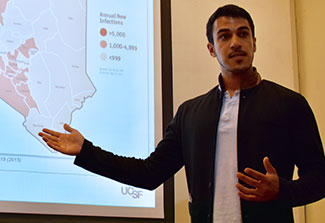Profile: Fogarty Fellow Neiloy Sircar uses legal skills to study human rights and HIV/AIDS in Kenya
September / October 2019 | Volume 18, Number 5

Photo courtesy of Neiloy Sircar/UCSF
As the first lawyer to participate in Fogarty’s
Global Health Fellows and Scholars program, Neiloy Sircar examined human rights and HIV in Kenya. The country has been encouraging testing and notification of partners and children who may be at risk as part of its strategy to control HIV and link more people with treatment. Sircar and the research team wanted to know if those practices and policies are effectively using what’s known as a rights-based approach, especially when it comes to consent, privacy and confidentiality.
“Are these programs actually protecting, promoting and fulfilling the human rights of those people who are benefitting from the programs? And if they are, how are they doing it? And if they aren’t, let’s identify ways to improve,” Sircar said of the rationale for his fellowship project, which was supported by Fogarty and the Afya Bora fellowship program. He was hosted by a prominent NGO known as
KELIN - the Kenya Legal and Ethical Issues Network on HIV and AIDS - and was mentored by its director, along with faculty from the University of Washington. Sircar studied human rights and global health law at Georgetown University.
He worked with KELIN’s lawyers and its partner community groups to conduct qualitative research. They wanted to learn what health care providers and at-risk populations know about legal and human rights and to identify barriers that might keep people from getting tested. The research focused on four key populations at risk of HIV, stigma and discrimination - young women, men who have sex with men, sex workers and injection drug users. The activities of the last three groups are illegal in Kenya.
Sircar wrote the guidelines for in-depth interviews and focus group discussions. He also designed a series of predominantly open-ended questions including: “Many people in your group are not testing for HIV. Why do you feel that is?” “Are you familiar with your legal and human rights?” “Do you feel there are any risks disclosing or sharing HIV status?” Questions for health care providers aimed to assess their understanding of human rights and whether they’ve received sensitivity training or any other related instruction.
The interviewers were Kenyans from the community organizations that work with the key populations. Sircar intentionally was not part of that process. “Seeing a foreigner in the room might affect how people answer questions,” he said. “What was important to me was that the people who were giving us candid, honest answers felt safe.”
The research team is just beginning to analyze the information collected. Sircar said his experience in Kenya taught him how to navigate the Institutional Review Board process, conduct qualitative research, do data analysis and manage a team. He credits the Fogarty fellowship with leading him to his current position as a postdoctoral scholar at the University of California, San Francisco and sees his career path heading to a U.S. institution focused on public and global health and human rights.
Sircar said colleagues have been excited to hear about his fellowship and how skills in law, policy, governance and regulation can complement or bring a new perspective to their research projects.
“There are a range of questions at all levels of public health and global health where having a legal background or a legal person on the team can be very helpful,” said Sircar, who wants to raise awareness among both the health and legal communities. “We are still seen as a fish out of water, the odd person in the room. But it doesn’t take much to articulate what it is that you can do to help this work along, to help achieve something good.”
More Information
To view Adobe PDF files,
download current, free accessible plug-ins from Adobe's website.